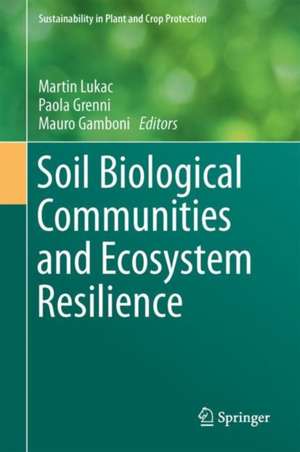Soil Biological Communities and Ecosystem Resilience: Sustainability in Plant and Crop Protection
Editat de Martin Lukac, Paola Grenni, Mauro Gambonien Limba Engleză Hardback – 7 oct 2017
| Toate formatele și edițiile | Preț | Express |
|---|---|---|
| Paperback (1) | 1040.95 lei 38-45 zile | |
| Springer International Publishing – 28 aug 2018 | 1040.95 lei 38-45 zile | |
| Hardback (1) | 1053.51 lei 38-45 zile | |
| Springer International Publishing – 7 oct 2017 | 1053.51 lei 38-45 zile |
Din seria Sustainability in Plant and Crop Protection
- 18%
 Preț: 1244.08 lei
Preț: 1244.08 lei - 24%
 Preț: 794.96 lei
Preț: 794.96 lei - 18%
 Preț: 1126.59 lei
Preț: 1126.59 lei - 15%
 Preț: 648.24 lei
Preț: 648.24 lei - 24%
 Preț: 781.64 lei
Preț: 781.64 lei - 18%
 Preț: 1107.56 lei
Preț: 1107.56 lei - 24%
 Preț: 818.76 lei
Preț: 818.76 lei - 24%
 Preț: 810.45 lei
Preț: 810.45 lei - 24%
 Preț: 792.90 lei
Preț: 792.90 lei - 20%
 Preț: 558.51 lei
Preț: 558.51 lei - 23%
 Preț: 579.82 lei
Preț: 579.82 lei - 24%
 Preț: 835.82 lei
Preț: 835.82 lei - 18%
 Preț: 944.67 lei
Preț: 944.67 lei - 18%
 Preț: 1380.98 lei
Preț: 1380.98 lei - 18%
 Preț: 951.91 lei
Preț: 951.91 lei - 18%
 Preț: 1229.28 lei
Preț: 1229.28 lei
Preț: 1053.51 lei
Preț vechi: 1386.19 lei
-24% Nou
Puncte Express: 1580
Preț estimativ în valută:
201.58€ • 210.47$ • 166.84£
201.58€ • 210.47$ • 166.84£
Carte tipărită la comandă
Livrare economică 31 martie-07 aprilie
Preluare comenzi: 021 569.72.76
Specificații
ISBN-13: 9783319633350
ISBN-10: 331963335X
Pagini: 347
Ilustrații: XI, 347 p. 58 illus., 41 illus. in color.
Dimensiuni: 155 x 235 mm
Ediția:1st ed. 2017
Editura: Springer International Publishing
Colecția Springer
Seria Sustainability in Plant and Crop Protection
Locul publicării:Cham, Switzerland
ISBN-10: 331963335X
Pagini: 347
Ilustrații: XI, 347 p. 58 illus., 41 illus. in color.
Dimensiuni: 155 x 235 mm
Ediția:1st ed. 2017
Editura: Springer International Publishing
Colecția Springer
Seria Sustainability in Plant and Crop Protection
Locul publicării:Cham, Switzerland
Cuprins
1. Introduction: the role of soil biodiversity in ecosystem productivity and resilience.- 2 Ecosystem services provided by soil microorganisms.- 3. Comparison of two molecular methods to assess soil microbial diversity.- 4. Towards integrated understanding of the rhizosphere phenomenon as ecological driver: can rhizoculture improve agricultural and forestry systems?.- 5. Impact of agricultural land management on soil bacterial community: a case study in the Mediterranean area.- 6. A metagenomic study on the effect of aboveground plant cover on soil bacterial diversity.- 7. What lies beneath: root-associated bacteria to improve the growth and health of olive trees.- 8. Norway spruce fine roots and fungal hyphae grow deeper in forest soils after extended drought.- 9. Ectomycorrhizal diversity in beech dominated stands in central Europe.- 10. Arbuscular mycorrhizal fungal communities pushed over the edge – lessons from extreme ecosystems.- 11. An intact soil core bioassay for cultivating forest ectomycorrhizal fungal communities.- 12.Potential role of beneficial soil microorganisms in plant tolerance to abiotic stress.- 13.Microbial communities, functional genes, and nitrogen cycling processes as affected by tree species.- 14. Ectomycorrhizal fungal responses to forest liming and wood ash addition: review and meta-analysis.- 15. β-glucosidase activity of forest soil as an indicator of soil carbon accumulation.- 16. Linking ecosystem variability and carbon sequestration: estimation of sequestered carbon in natural forests and perennial crops- 17. Bioactive peptaibols of forest-derived trichoderma isolates from section Longibrachiatum.- 18. Plant-assisted bioremediation: an ecological approach for recovering multi-contaminated areas.- 19. Bioavailability of polycyclic aromatic hydrocarbons in soil as affected by microorganisms and plants.- 20. Soil biodiversity and tree crops resilience
Textul de pe ultima copertă
This volume explores current knowledge and methods used to study soil organisms and to attribute their activity to wider ecosystem functions.Biodiversity not only responds to environmental change, but has also been shown to be one of the key drivers of ecosystem function and service delivery. Soil biodiversity in tree-dominated ecosystems is also governed by these principles, the structure of soil biological communities is clearly determined by environmental, as well as spatial, temporal and hierarchical factors. Global environmental change, together with land-use change and ecosystem management by humans, impacts the aboveground structure and composition of tree ecosystems. Due to existing knowledge of the close links between the above- and belowground parts of terrestrial ecosystems, we know that soil biodiversity is also impacted. However, very little is known about the nature of these impacts; effects on the overall level of biodiversity, the magnitude and diversity of functionssoil biodiversity generates, but also on the present and future stability of tree ecosystems and soils. Even though much remains to be learned about the relationships between soil biodiversity and tree ecosystem functionality, it is clear that better effort needs to be made to describe and understand key processes which take place in soils and are driven by soil biota.
Caracteristici
Illustrates the contribution of belowground biota to the overall stability of an ecosystem, with particular reference to microbial communities Enriches understanding of the plethora of functions performed by soil organisms and how these can be utilized to maintain delivery of ecosystem services Covers some of the latest thinking and methodological developments in the study of organisms inhabiting soils in tree dominated ecosystems
